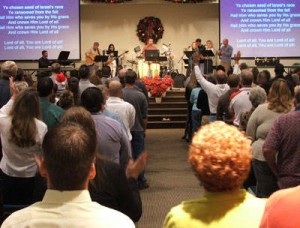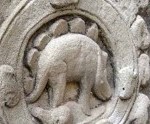 When someone tells me, “Oh, that’s interesting. So you prefer the disorganized kind?”
When someone tells me, “Oh, that’s interesting. So you prefer the disorganized kind?”
The conversation normally goes somewhat quiet when I ask that question. Usually most people have not thought about the matter to any great degree.
Yet, if we were to understand that WE and our feelings and opinions are not what matters on this issue – that we are not the center of the universe and in fact, that God has the right to orchestrate worship as He sees fit.. I know, what a concept!!… but yes, were we brave enough to stop and ask God’s opinion, seeking to find out what pleases Him, we would not read far in our Bibles before finding out that worship is to be carried out His way on His terms.
Remember Cain and Abel? Remember how one sacrifice was accepted by God (Abel’s) and the other was not (Cain’s). Remember the Tabernacle? Remember that His instructions had to be followed precisely and meticulously? Talk about organization… Entire books of the Bible were dedicated to revealing His precise instructions. God is holy and is to be treated as such by those seeking to approach Him in worship. Failure to do so had severe consequences. Nadab and Abihu were struck dead by God for seeking to design their own methods of worship. After their deaths, no one in Israel (including Aaron their own father) was allowed to even mourn their loss (Leviticus Chapter 10). Remember that?
Leviticus 10 reads: 1 Now Nadab and Abihu, the sons of Aaron, each took his censer and put fire in it and laid incense on it and offered unauthorized fire before the Lord, which he had not commanded them. 2 And fire came out from before the Lord and consumed them, and they died before the Lord. 3 Then Moses said to Aaron, “This is what the Lord has said: ‘Among those who are near me I will be sanctified, and before all the people I will be glorified.’” And Aaron held his peace.
4 And Moses called Mishael and Elzaphan, the sons of Uzziel the uncle of Aaron, and said to them, “Come near; carry your brothers away from the front of the sanctuary and out of the camp.” 5 So they came near and carried them in their coats out of the camp, as Moses had said. 6 And Moses said to Aaron and to Eleazar and Ithamar his sons, “Do not let the hair of your heads hang loose, and do not tear your clothes, lest you die, and wrath come upon all the congregation; but let your brothers, the whole house of Israel, bewail the burning that the Lord has kindled. 7 And do not go outside the entrance of the tent of meeting, lest you die, for the anointing oil of the Lord is upon you.” And they did according to the word of Moses.
8 And the Lord spoke to Aaron, saying, 9 “Drink no wine or strong drink, you or your sons with you, when you go into the tent of meeting, lest you die. It shall be a statute forever throughout your generations. 10 You are to distinguish between the holy and the common, and between the unclean and the clean, 11 and you are to teach the people of Israel all the statutes that the Lord has spoken to them by Moses.”
Frightening stuff, yes? Actually, its meant to be. It is a fearful thing to come before God in worship. All of us will be consumed if we do not come His way, on His terms, and by means of the sacrifice He has authorized. (see Hebrews 10:19-22)
So back to our discussion – were we to seek God’s thoughts on the matter, one of the many things we would find is that He loves the corporate worship gathering of His people, greatly preferring it to all of our private spiritual devotions combined.
“The Lord loves the gates of Zion more than all the dwellings of Jacob. Glorious things are spoken of you, O city of God.” (Ps. 87:2-3)
“And let us consider how to stir up one another to love and good works, not neglecting to meet together, as is the habit of some, but encouraging one another, and all the more as you see the Day drawing near.” (Hebrews 10:25, 26)
This is just the starting point of course, but rather than taking a poll of the community to ask for people’s personal preferences, its time we come on our knees humbly before God and with open Bibles ask Him, “What pleases You God? What is a true Church in Your eyes? What is Your view of worship? What isn’t?”
I hope that each of us are prepared to obey Him when He tells us the answers.

 (1) A Reminder – in case you were not aware (the blog has been down for 5 of the last 7 days): I was interviewed by Pastor Kevin Boling on the “Knowing the Truth” Broadcast about my book “Twelve What Abouts” (and the subject of Divine election) last week on a radio station covering all of South Carolina and parts of neighboring states. Dr. R. C. Sproul’s CD series The Promise Keeper: God of the Covenants is available in the Ligonier Friday $5 sale (normally $38). In this series, Dr. Sproul demonstrates that the one, true Promise Keeper always keeps His promises. He explains how God, throughout history, has fulfilled His promised plan of redemption in and through His people.
(1) A Reminder – in case you were not aware (the blog has been down for 5 of the last 7 days): I was interviewed by Pastor Kevin Boling on the “Knowing the Truth” Broadcast about my book “Twelve What Abouts” (and the subject of Divine election) last week on a radio station covering all of South Carolina and parts of neighboring states. Dr. R. C. Sproul’s CD series The Promise Keeper: God of the Covenants is available in the Ligonier Friday $5 sale (normally $38). In this series, Dr. Sproul demonstrates that the one, true Promise Keeper always keeps His promises. He explains how God, throughout history, has fulfilled His promised plan of redemption in and through His people. the Kulta of Australian aborigines, St. George and the dragon, and of course many Chinese legends. Often, the anatomical descriptions given are consistent, even though they come from separate continents and various times. These depictions match what we know from the fossil evidence of certain dinosaurs. Thus, dinosaurs are known directly from their fossils, and indirectly from cave drawings, tapestries, textiles, figurines, carvings, bas reliefs, and many oral and written eyewitness accounts, most of which are quite old.
the Kulta of Australian aborigines, St. George and the dragon, and of course many Chinese legends. Often, the anatomical descriptions given are consistent, even though they come from separate continents and various times. These depictions match what we know from the fossil evidence of certain dinosaurs. Thus, dinosaurs are known directly from their fossils, and indirectly from cave drawings, tapestries, textiles, figurines, carvings, bas reliefs, and many oral and written eyewitness accounts, most of which are quite old.